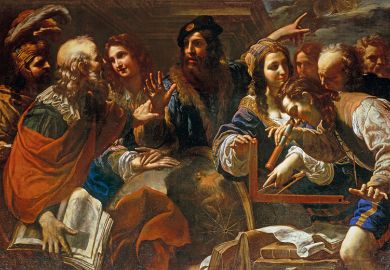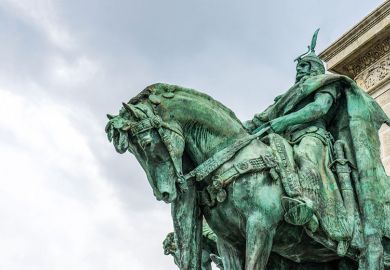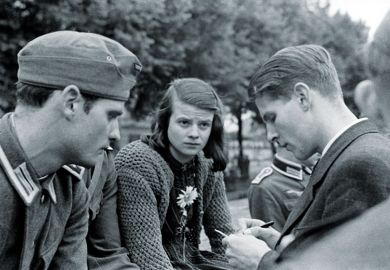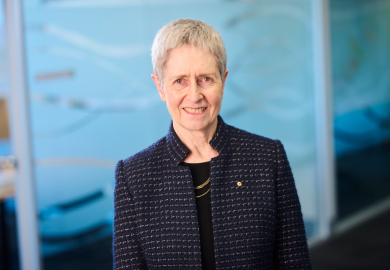The shortlist for this year’s Cundill History Prize was replete with the prominent university professors and celebrated writers that you might expect to see competing for what is said to be the world’s most lucrative prize for history writing.
Seven of the eight shortlisted candidates for the $75,000 (£58,000) prize, administered by Montreal’s McGill University, were from North America. They included former Brown University provost David Kertzer, for his book on the papacy’s loss of political power in the 19th century; Pulitzer prizewinning Washington Post columnist and London School of Economics professor Anne Applebaum, for a book detailing Stalin’s extermination of millions of Ukrainians in the 1930s via a deliberately induced famine; and Harvard professor Maya Jasanoff, for her life and times of Joseph Conrad, which won the award, announced on 15 November. The only name on the list from beyond the US was Tim Grady, reader in modern history at the University of Chester.
Grady’s book, A Deadly Legacy: German Jews and the Great War, published by Yale University Press in September 2017, also made the six-strong shortlist for the Wolfson Prize, the UK’s foremost history prize, alongside works by historians from the Russell Group universities of Bristol and Warwick, as well as two from University of London institutions.
Grady didn’t end up winning either prize, but his shortlisting for two such prestigious awards remains a significant achievement. “I’m at a small university,” he says. “So it does show…that it’s not [always the likes of] Oxford and Cambridge: other universities are recognised, and the work that goes on at other universities is recognised.”
While Grady has encountered snobbery, his success tells a story about carving out a research reputation while teaching at a regional university outside the supposed “elite” – at a time when policy is driving ever-greater concentration of research funding in the most prestigious research-intensive universities.
The subject of Grady’s research, too, is highly topical. The centenary of Armistice Day passed recently, and centenaries will follow for the formative events that came after the Great War, such as the signing of the Treaty of Versailles in June 1919. In Germany, the early interwar period was marked by continuing revolution, reaction, an explosion of political violence and a toxic growth of right-wing nationalism that fed itself with myth-making about the history of the Great War. Grady sheds light on how German Jewish participation in the fighting was falsified, helping to shape the notorious “stab-in-the-back” myth – the notion that the German military was never defeated on the battlefield, but was betrayed by socialists, communists and Jews at home – that eventually became core to the Nazis’ political messaging. This is a history that shows how “simplistic narratives of the past” can be “dangerous”, Grady says.
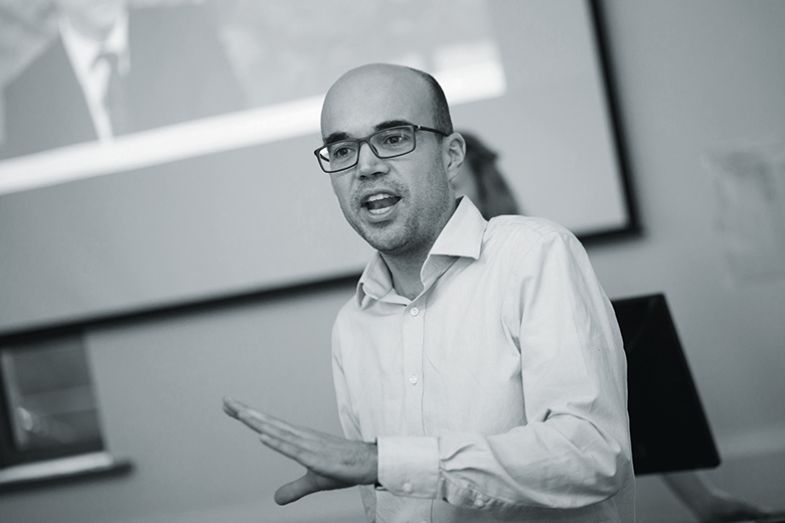
Grady’s journey into the study of German Jewish history as a “defining part of 20th-century German history” began with an undergraduate degree in German and history at Keele University – and, in particular, with a year abroad at the Friedrich-Alexander University of Erlangen-Nuremberg. During that time, he researched the “Jewish professors who were at the university in 1933”, the year the Nazi government began to introduce laws purging Jews and the “politically unreliable” from the civil service – including the professoriate. But he ran up against an oddly obstructive retired professor in charge of Erlangen-Nuremberg’s archive.
“There were no Jews here,” Grady (pictured above) recalls the professor telling him, as he refused access to the archive. Once Grady had explained that he knew that was not true, the professor grudgingly relented, but the student was left wondering why the professor had been so reluctant to grant him access.
Grady’s undergraduate dissertation on “academic antisemitism”, based on his Erlangen-Nuremberg research, earned him the runner-up award in History Today’s undergraduate dissertation prize, and was published in the magazine in 2002.
He went on to do a master’s in Jewish history and culture at the University of Southampton’s Parkes Institute for the study of Jewish/non-Jewish relations. There, he became interested in the “largely unwritten history of German Jews in the First World War”. Reading George Mosse’s 1991 book Fallen Soldiers: Reshaping the Memory of the World Wars was an important milestone. Mosse, a Jewish émigré from Nazi Germany who became a history professor in the US, talked about “how wars are remembered and the myths that come out of the remembrance”, says Grady. He discussed how German Jews “had fought in the First World War, but then had not really been allowed to remember their service thereafter”, while simultaneously writing of how the Nazis had removed Jewish names from war memorials – implying that prior to the Nazi period their service had been publicly acknowledged.
“Something didn’t fully stack up there,” Grady adds. “There had to be a wider history that needed to be written.”
That led on to his PhD on how the remembrance of the German Jews who fought in the war had been altered during the Third Reich. This became a book published by Liverpool University Press in 2012, titled The German-Jewish Soldiers of the First World War in History and Memory.
Yale University Press subsequently agreed that there was a need for a book on German Jews during the conflict itself and wanted to publish A Deadly Legacy as a trade book – intended for a general readership – given the subject’s potential wide appeal. Grady says he was “bit nervous at first” about this route. But now, he is “more and more convinced that, as historians, this is really what we should be doing. You can have new research and you can make it accessible.”
In researching the book, Grady studied diaries, letters and newspapers. Jewish escape and emigration from Germany meant that the source material was “scattered everywhere”, leading Grady to trawl a diverse range of archives, including the University of Leeds, the Jewish Museum in Berlin, the Central Zionist Archive in Jerusalem, and both federal and local archives in Germany.
Historians studying the First World War have increasingly shifted their focus away from the front line towards the multiple experiences of the war within the participating nations, Grady explains. He wanted to apply that perspective “and think about German Jews’ lives during the conflict as a whole”. For much of the time, the way German Jews experienced the conflict was “not exceptional”, he found – a significant point given the ways the German right “othered” Jews in its myth-making about the war, Grady writes.
For Jews in the military – nearly 100,000 served in German uniform – the war initially appeared to bring an easing of antisemitic discrimination, as the drive to increase troop numbers took precedence, Grady explains. Jewish soldiers were allowed to supply their own kosher food and had some leave entitlements for the major Jewish holidays. Rabbis also served, and conducted services in the field. Photographs of Jewish and Christian chaplains serving together circulated, writes Grady, with the aim of promoting a clear message: “Jews, for so long at the margins of the military and wider society, were now the equal of all other Germans.” A contemporary postcard image of Rabbi Jacob Sonderling in uniform holding a Yom Kippur service in the field with a group of Jewish soldiers (main image) is one of the more widely circulated images of Jewish military service, and features in Grady’s book – although various aspects of the image suggest it may have been doctored. “There were early reports of the rabbis’ work, but probably few images, so this may well have been an attempt to visualise their work,” says Grady. The Israelitisches Familienblatt, a Jewish weekly, “regularly published full-page spreads of those German Jews awarded the Iron Cross 1st Class” until the end of the war.
Some German Jews supported the case for annexing territories to the east, Grady writes, as it offered the prospect of rescuing from “Russian brutality” the Jews living in the Pale of Settlement – the area stretching from eastern Poland to modern-day Ukraine to which Jews had historically been confined by Imperial Russia. Expanding Germany to the east later became an obsession for the Nazis, with utterly different colonial, genocidal aims.
Given the inescapable facts of what came after the war, “you’ve got to be aware of the sensitivities [around] placing Jews back into German uniform, placing Jews back as participants in this conflict”, says Grady (pictured above right).
Writing about “German Jews involved in propaganda efforts, or German Jews arguing for annexations” is “very difficult”, he adds. “German Jewish survivors of the Holocaust, when they wrote their memoirs…found it very difficult to write about this earlier history... I’m very aware it’s a very sensitive history.”
That point is illustrated by the fact that, amid the warm reception for the book, one reviewer took strong exception to Grady’s approach. Anthony Kauders, professor of modern history at Keele, wondered what question A Deadly Legacy was trying to answer. In a review for European History Quarterly, he wrote: “If [the book’s] intention was to undercover [ sic ] a statistically relevant ‘Jewish’ responsibility for German colonialism, revanchism and right-wing extremism, then this endeavour, with its ominous undertones, has failed to convince the reviewer.”
Grady was “shocked” by the review. But he argues that “if you think of German Jewish history as a division between Germans and Jews, and the Jews were gradually, gradually forced out through increased antisemitism – then it’s quite obvious how the Holocaust would have come about”. If, on the other hand, German non-Jews and German Jews are considered as “deeply entwined peoples and communities, which actually shared lots of similar beliefs at different times, then how does the Holocaust come from that? That’s much trickier to understand. You can’t get simple narratives from that.”
He is convinced that “we have to think about less palatable and more difficult narratives of the First World War” – which “isn’t to attribute blame in any shape or form [for] what comes later”. He warns that “simple narratives of the past can themselves be…dangerous”. In Germany, such narratives led to “simplistic myths of [German] defeat”, such as the stab-in-the-back myth, which “ended up with Jews being [seen as] outsiders of the conflict thereafter”.
In 1916, as war and hardship continued, and the search for someone to blame began, there were antisemitic claims about Jewish soldiers “shirking”. These eventually culminated in a Prussian War Ministry census of Jewish troops, purporting to judge how many were on the front line, how many were in roles removed from the front line, and how many had won medals for bravery, Grady explains.
The bogus statistics “about how many Jews [were] fighting continues to be debated all the way through the 20s, the 30s. It never disappears – there’s always that suspicion [that Jewish troops shied away from the front line] from that moment onwards”, he says. When Jewish figures in the Independent Social Democratic Party were prominent in leading strikes in Berlin and Munich in January 1918, calling for peace and an end to food shortages, it “seemed to provide further evidence for those who believed that German Jews were somehow inextricably linked to revolutionary, unpatriotic behaviour”, writes Grady.
Then the war ended, “not just with defeat but with revolution, too”, a combination that “ultimately proves most dangerous for the Jewish population of Germany”, he says. The Jewish population became “associated with the revolution and…blamed, in the minds of the right, for encouraging the revolution. When this is combined with the idea of ‘shirking’ – they start to be pushed towards the margins.”
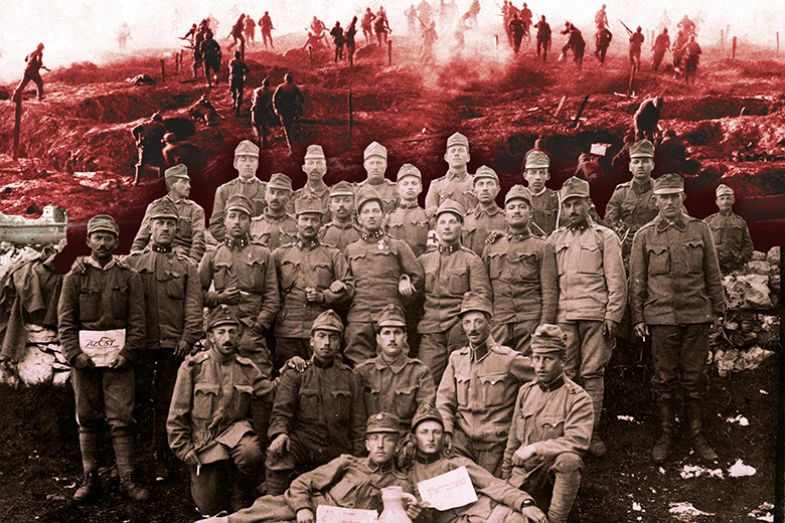
Grady’s research has achieved prominence despite his working at institutions outside the self-identified elite of the Russell Group.
“When I went to university, I never would have had any thoughts whatsoever – although I loved history – about making a career out of it,” he says. But the teaching of Colin Richmond – a medievalist who also taught on the Holocaust – was “really important” in setting Grady on a path into academia. And his year in Germany “suddenly forced me to think about history completely differently. [I found myself] thinking about parts of the past that are around you…I just loved that.”
There is plenty of the past all around you in Chester, but has it ever been suggested to him that the Roman city’s post-92 university – where he has been based for 10 years, after short-term roles at the University of Portsmouth – is not the right sort of location to build a career as a researcher?
“When I first went to Chester…there were people telling me: ‘You don’t want to stay at Chester long: you need to protect your research time,’” Grady admits. That message came from “people I knew at other universities, at bigger universities”, he adds.
“But what I would say, obviously, from writing this book and writing other books, [is that] I think you can make your time work – and you can make research work – at a smaller institution…Once people realise that you are writing stuff that is not bad, then I’m not sure if that snobbery stays.” Being made a committee member of the German Historical Society last year and becoming an external examiner at the University of St Andrews are testament to the fact that while “there are prejudices”, if “you can produce a body of work that is recognised” then it is possible to progress “at a smaller university like Chester just as much as you could elsewhere”, he argues.
And if research were restricted to “just the biggest institutions, rather than pools of excellence across the country”, it would be “very destructive” argues Grady. There are 10 academics in Chester’s history department, “all excellent historians doing a lot of research and a lot of teaching as well”. Their research “has local importance”, not just in terms of local history “but in terms of bringing our research to schools and colleges”.
Grady cites a recent occasion when he was invited to the rededication of a war memorial at a Catholic church in Chester. The invitation came after he had worked with church figures to reveal the histories of the named soldiers, including those from Belgium and Ireland. Academics’ ability to offer such help derives from “our own research”, he says. “Having smaller regional universities that do have research going on that is important locally for community work, for developing cultural activities, is so crucial.”
Removing research from regional universities would also destroy their ability to conduct research-informed teaching.
“I cannot see how you can teach at a university if you’re not doing research,” Grady says. There is “always something you’ve done – an archive you’ve been to, something you’ve read, something you’ve written about – that you draw on” in teaching students, he argues.
“If you’re not talking about [the topic of the lecture or seminar] through your own research, or through your own experiences, then it’s just about textbooks…it’s not a university. Research has to be there; it’s fundamental.”
POSTSCRIPT:
Print headline: Firm foundations
Register to continue
Why register?
- Registration is free and only takes a moment
- Once registered, you can read 3 articles a month
- Sign up for our newsletter
Subscribe
Or subscribe for unlimited access to:
- Unlimited access to news, views, insights & reviews
- Digital editions
- Digital access to THE’s university and college rankings analysis
Already registered or a current subscriber?

